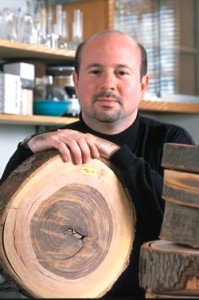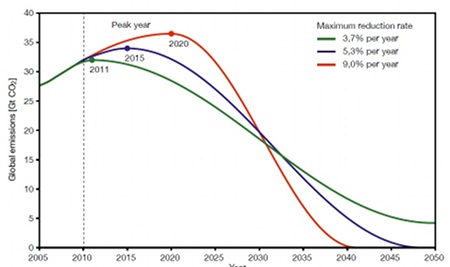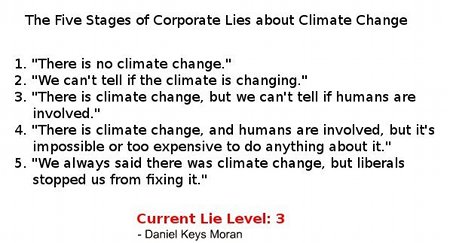Kaminsky, Curry, Me on Gleick and the Fake Heartland Strategy Memo
Tuesday, February 21st, 2012Continuing the previous discussion, there are some interesting developments in the Gleick controversy. I previously mentioned that Ross Kaminsky of Heartland had been very prescient in his speculation in a blog post at The American Spectator on Friday that Gleick might be the leaker. I commented at the end of a long discussion thread there to point out my logical problems with Gleick being both smart enough to obtain the real documents from Heartland via trickery, but dumb enough to forge and leak an easily debunked strategy memo along with them.
There was no comment in response to mine, but a couple of hours later Kaminsky added a comment pointing to a New York Times article on Gleick’s confession. Kaminsky wrote in that comment:
To those whose alarmist religion has caused them to excoriate me for this blog note, the politest thing I can think of to say to you is “I told you so.”
I added a response to that comment that read as follows:
Yeah, you did. Good call by you, obviously.
I’m impressed by your ability to deduce that Gleick was the leaker. I don’t actually know the personalities of any of the principals in this whole thing, and it sounds like you do, so maybe you can help me figure out something that’s troubling me: Where did the original faked strategy memo come from? Andy Revkin has said that suspicion will now fall on Gleick of having forged it himself. But if Gleick did forge the strategy memo, why would he have included it in the document release after he got the legitimate documents from Heartland? From my reading, there really isn’t anything substantive in the fake strategy memo that isn’t in the legitimate documents. If Gleick was the one who forged the strategy memo, why risk including it in the release? It just seems like he’d be asking for Heartland to disown it as fake, thereby discrediting the entire release (as actually happened).
It bugs me, because it just doesn’t seem to make sense. The scenario as Gleick has described it (he received the fake memo anonymously, verified it by obtaining the legitimate documents, then released them all together) sounds more credible to me, at least in terms of explaining Gleick’s actions. But in that case, who created the forged memo, and for what purpose?
The forged strategy memo is similar enough to the legitimate documents that it seems clear that whoever forged it had detailed knowledge of Heartland’s internal budget and planning. But if the person who created the strategy document and leaked it to Gleick had that knowledge, why bother leaking him the forgery? Why not just leak him the legitimate documents in the first place?
As I say, I don’t really know the personalities involved here; I’m just looking at the known facts and trying to fit the pieces of the puzzle together. Can you help?
There was no reply to that comment, but (interestingly) the comment thread on that item has either been closed, or my IP address or user account has been disabled from further commenting. (Update: And I now can post again. I now think I was too quick to infer active blocking of my commenting, and that it’s likely that it was just that my comment was too long, or there was some glitch on the server side.) Also, I’m unable to comment (Update: again, I now can, and have, commented on the item) on a newer blog entry, in which Kaminsky writes:
On his Huffington Post blog (but notably not, or at least not yet, on his Forbes blog), Peter Gleick admitted to using another’s identity to steal Heartland Institute documents, although he still has not admitted to being the author of the forged document that has caused most of the controversy.
If those climate alarmists who went after me (for what I said explicitly in my note was “my speculation”) had any honor, they would not just apologize, but feel some guilt for being associated with the religion of climate change whose high priests could sink to identity theft because they feel “frustration” at not being able to get the rest of the country to join their rent-seeking, anti-human cult.
In the meantime, I take some satisfaction in believing, though I’ll never know for sure, that my article gave Mr. Gleick some incentive to confess, before the FBI agent came to his door. Or perhaps he just didn’t want to spend the money on a new (non-Epson) scanner.
Judith Curry, chair of the School of Earth and Atmospheric Sciences at the Georgia Institute of Technology, has posted a wonderful note talking about the depth of Peter Gleick’s hypocrisy: “The irony of it all, this coming from a scientist that has made a particular point about integrity and written many essays and even testified to congress on the subject.”
I’m still able to comment on the linked-to item by Dr. Curry, where I wrote the following. (My inadvertent use of “Ms.” from the original comment replaced here by the more-correct “Dr.”)
[Dr.] Curry writes, “I seem to have gotten his goat to have been mentioned in the fake Heartland strategy doc (hard to believe that he didn’t write this).”
This is the part I’m having a hard time figuring out.
In Gleick’s confession, he says he first received the strategy memo anonymously, then obtained the legitimate documents by deceiving Heartland. Then, since they seemed to be more or less consistent, he leaked them all. It sounds like [Dr.] Curry favors a different explanation, in which Gleick obtained the legitimate documents, then forged the strategy document using the information obtained from them.
This doesn’t make sense to me, though. If he already had the legitimate documents, why would he risk undercutting their impact by also releasing the forged strategy memo? There’s nothing substantive in the strategy memo that isn’t also in the legitimate documents. So why add the forged document to the mix? It would just be handing Heartland a convenient way to take the moral high ground (since they would immediately know the document was fake and identify it as such, as actually happened).
If Gleick is telling the truth about the sequence of events, though, his inclusion of the forged memo makes more sense: He included it in the release because he didn’t know it was fake. The legitimate documents he had obtained from Heartland seemed to confirm the details in the strategy memo, so he assumed that it was legitimate. But this scenario has a problem that bothers me, too: Who forged the strategy memo and supplied it to Gleick?
The details in the strategy memo show that whoever forged it had access to internal Heartland budget and planning information. So I guess we can go back to the original speculation from last week about a disgruntled insider, former employee, or Heartland board member. But here again, something doesn’t match up. If someone with access to the real budget and planning documents inside Heartland wanted to discredit the organization, why not leak those documents to Gleick? Instead, this hypothetical insider appears to have used the information in the real documents to forge a credible-sounding, but demonstrably fake, summary, and supplied that to Gleick. Why would the forger do that? What purpose could be served by leaking Gleick a document that could be easily denounced as a fake by Heartland, when the insider could just as easily leak the real thing?
Ross Kaminsky of Heartland was quite prescient in a blog post at The American Spectator last Friday in which he singled out Gleick as a likely source of the leaked documents. In that piece he pointed out the similarity of this incident to that of the forged “Killian documents” that brought down Dan Rather. I agree with him that the similarities between the two cases are striking. Many people said at the time of that earlier incident that Rather (or his producer Mary Mapes) must have forged the Killiam memos, just as [Dr.] Curry appears to be saying that Gleick may have forged the Heartland strategy memo. To me, though, that’s reminiscent of Conan Doyle’s phrase about giving the accused “credit for having too much imagination and too little.”
It’s all very curious.
So, the fun continues…
Update: More commentary:



